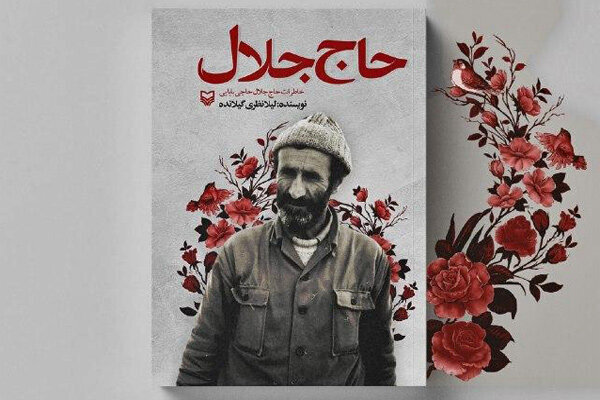The lonely man in the days of the war

The “Haj Jalal” by Leila Nazari Gilande is the memories of Jalal Hajibabaei, his family and, what happened to them during the war.
According to the author, probably one of the reasons he was chosen to write Haj Jalal's memoirs is that he also experienced a rural lifestyle as the main character. His last name is the name of a village in Ardabil province where he was born and raised. Nazari was born in 1985. She is one of the most active writers in the field of war and has published 18 books so far.
*What has inspired you to write about war?
I was not a professional writer, but I was a researcher in the research section of the broadcasting organization who also liked writing. In 2010, a friend of my father, who was a fighter, gave me his diary to read, and reading it, I saw a couple of mistakes that I suggested the author to correct and that was the exact moment I got the idea of writing the memories of my own city's fighters. I became so interested in books about holy defense, so I went to the library and read everything there about the memories of our city and other cities on those days, until one day when I felt that I can challenge myself. I went to the person who was in charge of that place and asked him whether there was any warrior to write about. He wanted me to write about Colonel Ali Ghaffari’s memories in one or two pages to see what I could do but instead of one or two pages, they got a book about him which was shocking for them. After giving my book, I went out to buy a laptop by selling my ring and then type the book "To The Arvand" which was the memories of Colonel Ali Ghaffari, and from now on, I was a writer.
"Behind the Waiting Windows", memories of six wives of captive soldiers and, "The Role of Women in Ardabil Province in Holy Defense" were the following books I wrote. After that, I was constantly looking for a new case to write about and so far 18 books have been published.
*How long did it take to write the book?
In May 1996, I went to Hamedan for a while with my friend, Maryam Zandi who help me a lot while interviewing Haj Jalal there, and when we came back, with some editing, I finished it until the new year.
*What period of his life did you write?
I wrote his story back when he was still a child until now that he an old gardener.
*Tell us a little about the challenges during the interview
He had forgotten some information due to aging, so I had to talk with his family and some of his relatives too. I had conversations with his wife, daughter, son, his sister, and his cousin.
* Which parts of these memories were more important to you, being a fighter or being the father of a martyr?
The memories were not just about him as a worrier or martyr’s father. They were about his whole family and their stories in different and difficult situations like when all the men in the family got killed and remained the only man one with so many responsibilities as an old man who tried to be strong in front of his wife and daughters but cried a lot when he was alone.
* Which part of the book impressed you the most?
It was the part when one day, he came home and found the room of his son’s wife empty and dark, and he realized that she went back to his father’s house after his husband got killed. Then, when his own daughter became a widow and a grandchild who didn’t have a father any longer. These all tragedies were a lot for him to tolerate.
After his sons and son-in-law got killed, Jalal himself decided to go to the war with his sister’s husband, but he got killed too and Haj Jalal came back home with five children and no father.
* Why did he decide to go to the war?
He said the boys and grooms were gone and it was his turn. It was more like he was going to fine his sons.
Leave a Comment